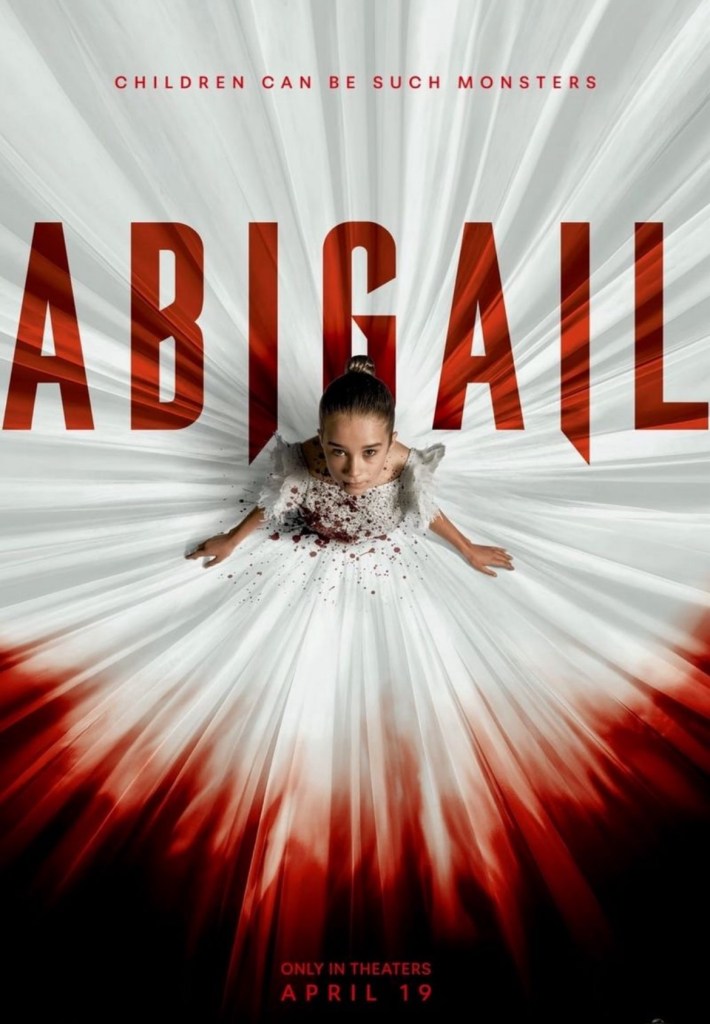
.
It’s a varying scale when it comes to how much time passes between a female child actor’s breakout role and her turning up in a vampire film or TV show. Anna Paquin took fifteen years to get from The Piano to True Blood. It was six years for Kristen Stewart between Panic Room and Twilight, and five for Saoirse Ronan to go from Atonement to Byzantium. Chloë Grace Moretz went from Kick Ass to Let Me In within a year, but in that case the first movie was more violent and bloodier than the later one so it isn’t quite the same. Kirsten Dunst is of course the winner, starting out in Interview with a Vampire, when she was eleven.
Alisha Weir’s transition has also been quick, going from Matilda the Musical to this, in seventeen months. With her having been so sweet in the Roald Dahl film, lots of people are commenting on the contrast here. She was in February’s Wicked Little Letters too, and it was shocking enough seeing her swear in that. Sure, Matilda was occasionally fierce and is driven by revenge but in Abigail she is definitely stepping it up.
While these are two very, very different movies though there is something of what was so good about Weir’s performance in Matilda that also works for her here. Both characters have a certain impishness that serve the stories well. Whereas in the other film she developed what could be seen as supernatural powers though, here she is a full on demon. The film doesn’t shy away from this either, it is comedy violence but it is strong violence and Weir herself, at fourteen, is way too young to watch the scenes she is acting in. What this does do though, so early in her career, is truly mark her out as a proper film star. These two movies together, so close together, confirm Weir to be an actor of great versatility who is prepared to do exactly what is required to get the most out of the part she is playing. It took Emma Stone sixteen years to achieve the same.
The film, in case you don’t know, is about a group of criminals who kidnap a teenage girl only to discover that she is an unaging monster. Around Weir we have, among others, Melissa Barrera, working again with her Scream directors Matt Bettinelli-Olpin and Tyler Gillett, Kathryn Newton and Dan Stevens, all bringing their own value. Stevens, it has to be said, has also come some way from his initial signature role in Downton Abbey. The tone is similar to Bettinelli-Olpin and Gillett’s Ready or Not as the players play cat and mouse around a beautiful gothic building and while it doesn’t drum up any big laughs or scares, it is good gory fun.
The true nature of the title character is all over the marketing and trailers, which is why I’ve made no effort to avoid discussing it here, but the film plays out like it’s a twist. Had this remained a secret it would have been a great surprise but without this being kept under wraps the movie is initially quite predictable. I totally guessed the order in which the kidnappers would get picked off. As it progresses though, it does have some tricks up its sleeve. It is also quite clever in how it makes you care for certain characters at different points. None of them are heroes but some of them you root for.
.
The Ripley Factor:
Scary little girls are definitely a bit of a trope in horror films, with M3gan, Orphan, The Ring, The Exorcist and the aforementioned Interview with a Vampire. I’m not sure it’s one we need to worry about this though. There is certainly a deep analysis of this trend waiting to happen because when young boys feature in the genre they are more often than not the hero, like in The Shining and The Witches. There are outliers like The Omen but there is a definite gender imbalance here. Female cliches are not necessarily sexist cliches though. Yes, it is putting forward the idea that adolescent girls are more prone to evil than boys but these characters are also powerful and strong and generally have great agency. They are also generally very smart. With their age they avoid witch or crone cliches and they are similarly too young to be vamps or seductresses. On the other hand part of the idea is based on the assumption of innocence, which is pretty reductive. In the end you just have to look at how they are portrayed and in the case of Abigail she is reasoned, calculating and motivated by a sense of justice, misguided or otherwise. She is also cold and malicious but sometimes you’ve got to be a little bit naughty.
.